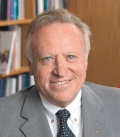
The prize was awarded to Prof. Apeloig, a member of the Schulich Faculty of Chemistry, for “his groundbreaking achievements, experimental and theoretical, in researching the chemistry of silicon, and especially for his contribution to preparing and understanding the behavior of multi-bonded silicon materials (double and triple connections).” Many believed that these materials could not exist. Prof. Apeloig was one the first to predict in theory the possibility of their existence and afterwards – to synthesize and research their properties
In addition, Prof. Apeloig made a central contribution towards researching the chemistry of silicon-containing, intermediary materials with high activity. The special integration in his research of experimental and theoretical methodologies based on quantum theory led to a deeper understanding of the tremendous and surprising differences in the properties and behavior of carbon and silicon compounds (elements belonging to the same family in the Periodic Table of elements according to which, it was anticipated they would behave similarly). Prof. Apeloig’s research broke ground for new fields and many groups in the world today are researching areas he pioneered.
Two years ago, Prof. Apeloig won the Wacker Silicone Award, the second most prestigious and important prize in silicon chemistry next to the Kipping Award. He won the prize for “his pioneering and groundbreaking achievements in understanding the structure, properties and behavior of organosilicon compounds.”
Organosilicon compounds are not found in nature and are completely man-made. The first compounds from this family were initially produced in the laboratory some 70 years ago for purely academic reasons, by Frederic Stanley Kipping, the pioneer in this field. But almost from the start, as soon as their interesting properties were discovered, they also aroused great interest in industry. Silicones, one of the most important organosilicon materials, have important and unique properties. They are extremely waterproof and therefore are used in preserving structures and as insulation. They do not evoke reactions when in contact with the human body and therefore are commonly used in cosmetic products and various implantations as well as in materials inserted into the body such as catheters and infusions. They also hold up exceptionally well under severe weather conditions and drastic temperature changes. For example, the boots worn by Neil Armstrong, the first man to walk on the moon, were made of silicon rubber, which is the only material known to man that can stand up under the extreme conditions on the moon’s surface.

